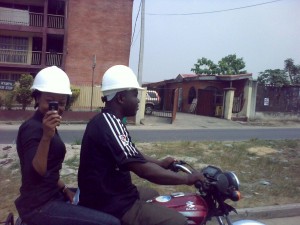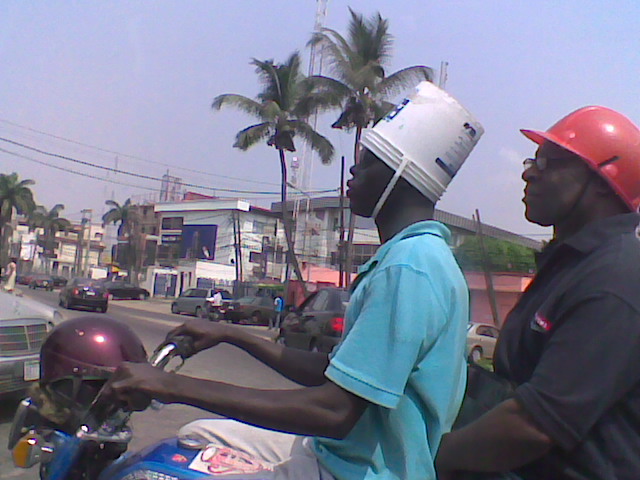My arrival in Lagos Nigeria a few days ago coincided with the new wave of enforcement by the Federal Road Safety Commission (FRSC) regarding motorcycles in Nigeria. Unsurprisingly, most affected by this revived enforcement have been the commercial motorcycle operators popularly referred to as “okada”. According to news reports, thousands of them have been arrested and fined nationwide since 1st January 2009 for failing to comply with the rules.

Nigeria is a country with multiple grievous national problems and the lack of an efficient metropolitan transport system created a loophole that the okada operators have exploited but their activities have largely been unregulated. Now that FRSC is trying to enforce some existing rules, they are crying foul and complaining that the government is help-bent on pushing them out of business.
Nigerians are used to problems and have become masters at improvising in the face of lack or difficulty. I was thus not very surprised that most of the okada riders have only been pretending to comply with the new enforcement of a law which states that they must wear a crash helmet and insist that their passenger [if any] wears one as well at all times. I have been seeing all sorts of helmets that are anything but motorcycle crash helmets: construction worker helmets (this is the most common), bicycle helmets, cycle racing helmets, soldiers’ helmets etc. The okada operators insist that they cannot find the helmets to buy, or the ones they find are too expensive. Of course, helmets that are not designed for motorcycle riders cannot protect the riders effectively in the event of a crash.
When a close friend suggested that we might find someone using a calabash as helmet, I chuckled partly because I knew it could be true, and partly because it was so far-fetched and absurd. Nothing prepared me for what you see in the photo below:

Someone described the photo as Nigerian ingenuity but I think it is insanity.
Other issues that have cropped-up include the concerns about hygiene since so many people would be sharing the same helmet. Another concern about the possibility of people disappearing after wearing a helmet due African voodoo is nonsensical.
My point is simple, if okada must exist, the operators must be closely monitored and rules enforced. It is in the interest of the segment of the public that patronizes them.
Since this is my first blog post in 2009, may I wish my readers a Prosperous New Year 2009.





The ‘Okada’ craze is also affecting moto drivers in Cameroon.
A recent gov’t communiqué stipulated that :
okada drivers must now were helmets, together with their passengers;
their okadas must be painted yellow;
This is going to be a big blow for what is serving as a job for many of the unemployed, especially in the town of Douala.
😥 It is tragic to see that the safety message is not clearly understood! The bikers in South Africa believe in the motto ARGAT – “All The Gear All The Time”. More info on this is available on the Arrive Alive website. The helmet is the most important piece of safety equipment! May helmets be readily available and affordable in Nigeria!!
Thanks for posting on this and adding the pictures! Images do speak way louder than words!
I have blogged on this topic as well, on Grandiose Parlor. From what I can see, the authorities have clearly failed in their quest to enforce crash helmets for the bikers.
The use of plastic buckets, pumpkins shell, calabash and construction helmets is both hilarious and tragic at the same time.
The barriers facing the intervention are clear – cost of helmets and cultural beliefs. These must be tackled reasonably — they are not “nonsensical”, but real issues needing addressing. This is not the kind of stuff that works well via executive fiat as it’s being done.
This is hilarious and pathetic at the same time. It simply shows that the average okada operator lacks understanding of why the government insist they must use crash helmet.
As for the fear of “African Voodoo” you may consider it nonsensical as much as you like, but sadly in Nigeria it is part of the reality on ground. Happy New Year!
If the locals cannot afford a proper crash helmet then why not start to import used but not damaged crash helmets from elsewhere? I have two old but undamaged (just worn inners etc.) that I am loathe to throw away when they can still be used effectively. It is recommended that helmets are replaced every 5/6 yrs (at least in the UK) so I have. What to do with 2 helmets?
I am concerned on the hygiene aspect of using helmets.Some of the helmets can be very dirty.This calls for serious concern.I think it better while using the helmet to do any of the following;
1.use a large handkerchef
2.Wear a shower cap or tie a scarf (mostly would favour ladies) and for guys wear a cap( face cap or other variants)
3.Buy your personal helmet
As for me I have bought a personal one and also have some round shaped facecaps I now use since it is not easy carrying the cap everywhere.
I insist that people disappearing for wearing a crash helmet is arrant nonsense. If it’s reality, kindly bring forth the evidence. 😀
Many guys here in Onitsha taught it is an iron cap desingned to cost them some cash.May God help my country people.
“The Law” was originally intended to protect the citizenry, and not punish them. In most parts of Africa, the average citizen seems to believe the contrary. Just ask the average motorist about their perception of the Police force for instance, and hear what they have to say- You would most likely get a stern lecture on bribery and corruption.
We live in human societies, and all humans have a psyche. Ancient philosophers believed that if one was able to harness the psyche of another individual, they could bend their will to suite their purpose. The FRSC (and all other Law Making and Enforcement Agencies for that matter) needs to approach Law enforcement from a different perspective- they should rather focus more on the “education” aspect of it, rather than the punitive.
Stipulating laws, without following up with the right amount of education- especially in this part of the world- will surely get you nowhere. Some would argue that the essence of some dictates are straightforward, and do not require education, but the images above clearly suggest otherwise.
It is easy to make someone change a bad habit against their will, but if they do not understand the purpose, they would surely return to it (especially when your not looking- lol)
P/s: I completely agree with you on this one David- It is is rather appalling to find that in this day and age, people still believe (and spread) such stories(disappearance). But one would understand that, judging from our history.
[…] (from Paradox Off Planet This January Nigerian authorities have enforced bikers and their passengers to wear helmets while riding a motorbike. Since the low standards of living and the terrible traffic jams in Nigerian capital Lagos making motorcycles the most popular vehicle, the new regulations have affected really a lot of people. And a lion’s share of them (oh, forgive me such choice of words) just can’t afford a brand new US$100 helmet. So they have to improvise. Photos by Oluniyi David Ajao. […]
[…] This January Nigerian authorities have enforced bikers and their passengers to wear helmets while riding a motorbike. Since the low standards of living and the terrible traffic jams in Nigerian capital Lagos making motorcycles the most popular vehicle, the new regulations have affected really a lot of people. And a lion’s share of them (oh, forgive me such choice of words) just can’t afford a brand new US$100 helmet. So they have to improvise. Photos by Oluniyi David Ajao. […]
notice in the bucket head photo that he has a proper helmet on his bike bars lol.